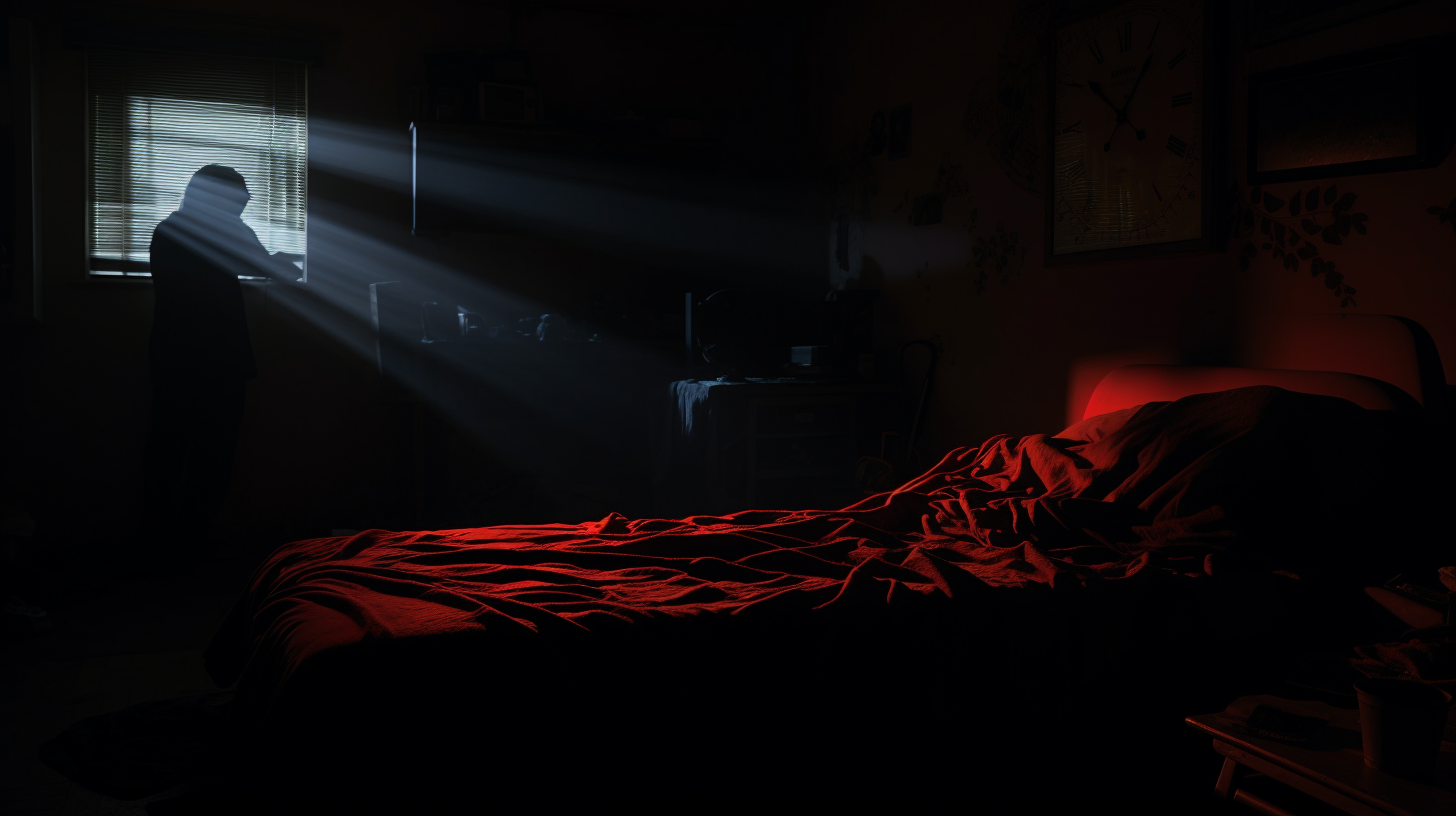You’ve just watched a horror film and now, sleep eludes you. Every shadow is sinister, each noise, a potential threat.
Why does this happen? It’s not just your imagination. There’s science behind those sleepless nights post a horror marathon.
This article unpacks how fight-or-flight responses, stress hormones, and individual sensitivity play a role.
Next time, before diving into a scary movie night, you’ll know what to expect.
How horror movies create fear and suspense
In spite of their unreal nature, horror movies can stir up real fear and suspense in you, making sleep elusive after a late-night scare fest. Filmmakers employ a range of sophisticated techniques to tap into your primal human responses, creating compelling fictional scenarios that trigger your body’s fight-or-flight response. The jump scares, eerie music, and ominous settings all work in concert to elicit a visceral response from you, causing you to grip the edge of your seat or flinch in fright.
This reaction is more than just skin-deep. Your body interprets these fictional threats as real dangers. Your autonomic nervous system, responsible for controlling involuntary behavior, kicks into overdrive. The sympathetic branch of this system triggers your stress response, flooding your body with hormones like adrenaline. This physical reaction, coupled with your mind’s immersion in the gripping plot, blurs the line between fiction and reality.
So, while your logical mind knows the horror unfolding on the screen isn’t real, your body reacts as if it is. You scream, not just from the shock but as an instinctive warning to your ‘tribe’. This is a deeply ingrained survival mechanism, honed over tens of thousands of years. Even after the movie ends, these stress hormones can continue to course through your body, interfering with your ability to sleep.
How scary movies, stress, and sleep are connected
When you sit down to watch a horror flick, you’re not just signing up for a couple hours of fright—you’re also setting the stage for a potentially restless night. This is because horror movies create authentic feelings of stress that stimulate our autonomic nervous system.
This system, which controls involuntary behavior, is made up of the sympathetic (‘fight or flight’) and parasympathetic (‘rest and digest’) systems. The moment you perceive a threat on screen, your sympathetic system kicks into gear, triggering a series of events that lead to the release of stimulating hormones like norepinephrine, cortisol, and adrenaline. Your heart rate increases, your pupils dilate, and your muscles tense up, preparing for action.
Understandably, all this stress can hinder a restful, restorative sleep. Even though we can learn to distinguish between real and fictional threats, we can’t always control our body’s initial response to stimuli. Stress inhibits the parasympathetic system, thereby reducing our ability to relax and even digest that popcorn you’re munching on.
Research has shown that stress can decrease both deep and REM sleep, and increase periodic arousals. And while it’s not fully understood, evidence suggests that stress can intensify in response to sleep deprivation, creating a vicious cycle. In other words, one sleepless night due to a horror movie can lead to long-term sleep issues.
Why you might want to avoid watching scary movies on a spooky night
Despite the thrill of a spooky night, you might want to reconsider watching that horror flick, as it could lead to a restless night full of stress and anxiety. While it’s easy to get swept up in the excitement of a spine-chilling movie marathon, the potential repercussions on your sleep quality are far from trivial.
After all, good sleep is crucial for your wellbeing, and intentionally disrupting it mightn’t be the best idea.
Here’s why:
Stress and Anxiety: Scary movies can trigger a genuine stress response. This elicits feelings of fear and anxiety, which don’t exactly set the stage for a peaceful night’s rest.
Disrupted Sleep Patterns: The stress hormones released during and after the movie can interfere with your ability to fall asleep and stay asleep. It may also decrease the amount of time spent in deep sleep and REM sleep, both of which are vital for feeling rested and refreshed in the morning.
Nightmares: Horror flicks can influence your dream content, potentially leading to vivid nightmares that incorporate elements from the movie. This can further disrupt your sleep and leave you feeling fatigued and groggy the next day.
Possible Long-term Effects: One sleepless night due to a scary movie could set off a vicious cycle of stress and sleeplessness that has long-term repercussions on your sleep quality and overall wellbeing.
Conclusion
So, you can’t sleep after a horror flick, huh? That’s your body’s fight-or-flight response in action, coupled with a rush of stress hormones messing with your snooze cycle.
And, some of us are simply more susceptible to these effects. Next time, remember this before you queue up a scary movie on a dark, ominous night.
Understanding the science behind your post-movie sleeplessness might just save you a night of tossing and turning.
Frequently Asked Questions
You’re struggling to calm down after a scary movie scene. Try deep breathing exercises, visualizing a peaceful scene, or distracting yourself with a light-hearted book or show. It’s okay, everyone gets spooked sometimes.
You’re asking if horror films can cause long-term psychological issues. Yes, studies suggest excessive exposure to horrifying content may lead to anxiety, sleep disorders, and even PTSD. It’s important to monitor your reactions.
You’re wondering if scary movies have benefits like boosting resilience or fear tolerance. Indeed, some studies suggest horror films can desensitize viewers to fear, acting like exposure therapy. But reactions vary greatly among individuals.
You can’t entirely prevent it, but you can help. Discuss the difference between real and make-believe, reassure them of their safety, and establish calming bedtime routines to help ease their fears after encountering a scary movie.
Absolutely, the type of horror movie can affect your fear intensity and sleep disturbance. Psychological horrors may linger in your mind longer, causing more sleep issues than monster flicks that rely more on jump scares.
